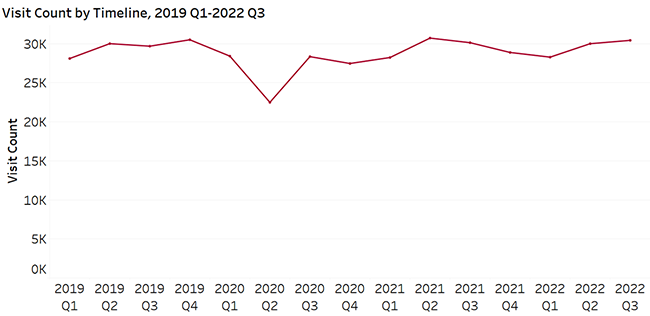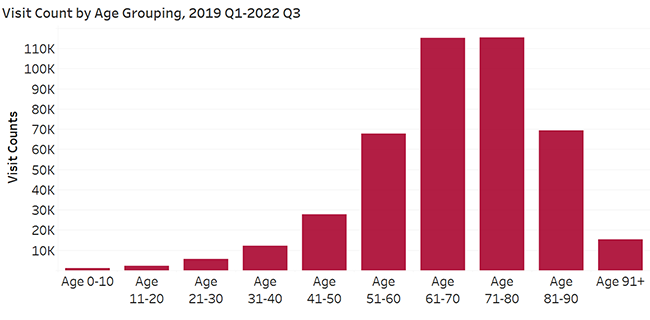Vol. 67, Issue 5
View more issues of The Valued Voice
Sign Up for WHA's Newsletter
Click here to view past issues
IN THIS ISSUE
- Biden Administration Announces PHE will End May 11
- Appeals Court Sides with Drug Manufacturers in 340B Contract Pharmacy Case
- 'The House Always Wins': Insurers' Record Profits Clash with Hospitals' Hardship
- Fast Forward Grants an Opportunity to Leverage Health Care Career Pathways
- WHAIC’s Mueller Elected AHIMA 2023 Board President/Chair
- WHA Foundation’s 2022 Year in Review Report Available
- Fast Facts from the WHA Information Center: February is American Heart Month
- Wisconsin Rural Health and Substance Use Clinical Support (RHeSUS) Program February Offerings
EDUCATION EVENTS
Aug. 8, 2025
WHA Financial WorkshopSep. 17, 2025
2025 Annual Wisconsin Organization of Nurse Leaders ConferenceJan. 28, 2026
2026 WHA Health Care Leadership AcademyClick here to view education event calendar
View more issues of The Valued Voice
Sign Up for WHA's Newsletter
Thursday, February 2, 2023
Fast Facts from the WHA Information Center: February is American Heart Month
February is known as American Heart Month, bringing awareness to cardiovascular health. The Centers for Disease Control and Prevention states that heart disease is the leading cause of death for both men and women. One person dies every 34 seconds in the U.S. from cardiovascular disease. There are about 700,000 people in the United States who died from heart disease in 2020. Coronary heart disease is the most common type of heart disease with about 20 million adults aged 20 and older affected. Each year, around 800,000 people suffer from a heart attack in the U.S. Heart disease is the leading cause of death for people of most racial and ethnic groups. These statistics bring to light how serious and prevalent heart disease is in the United States.

The WHA Information Center analyzed heart disease claims from all places of service from January 2019 through September 2022. The age groups with the highest number of visits are ages 61-70 and 71-80, with roughly the same number of counts. The average age of a patient visiting with a heart disease-related condition is 68 years old. With that being said, heart disease can happen at any age. High rates of blood pressure and obesity among younger people puts them at higher risk for heart disease earlier in life. Based on WHAIC data, men have a higher number of heart disease-related visits than women do.

Here are five interesting facts about heart health:

The WHA Information Center analyzed heart disease claims from all places of service from January 2019 through September 2022. The age groups with the highest number of visits are ages 61-70 and 71-80, with roughly the same number of counts. The average age of a patient visiting with a heart disease-related condition is 68 years old. With that being said, heart disease can happen at any age. High rates of blood pressure and obesity among younger people puts them at higher risk for heart disease earlier in life. Based on WHAIC data, men have a higher number of heart disease-related visits than women do.

Here are five interesting facts about heart health:
- Heart attacks can be silent: One in five heart attacks occur without the person even knowing they had one.
- Heart attacks affect women differently: Women may experience different symptoms than men. These include pain in the back, arm, neck, or shoulder; nausea; fatigue; shortness of breath; and vomiting.
- Young women are at higher risk than men: Women under the age of 50 are twice as likely to die of a heart attack as men in the same age group.
- Another reason to hate Mondays: Heart attacks are more likely to occur on Monday mornings than other days of the week. Scientists attribute this to the disruption in our circadian rhythm over the weekend which leads to increased blood pressure and other changes to the nervous system.
- Diet soda raises heart attack risk: If you drink one or more diet sodas a day, your chances of having a heart attack are 43% higher than those who drink regular soda or none at all.
Vol. 67, Issue 5
Thursday, February 2, 2023
Fast Facts from the WHA Information Center: February is American Heart Month
February is known as American Heart Month, bringing awareness to cardiovascular health. The Centers for Disease Control and Prevention states that heart disease is the leading cause of death for both men and women. One person dies every 34 seconds in the U.S. from cardiovascular disease. There are about 700,000 people in the United States who died from heart disease in 2020. Coronary heart disease is the most common type of heart disease with about 20 million adults aged 20 and older affected. Each year, around 800,000 people suffer from a heart attack in the U.S. Heart disease is the leading cause of death for people of most racial and ethnic groups. These statistics bring to light how serious and prevalent heart disease is in the United States.

The WHA Information Center analyzed heart disease claims from all places of service from January 2019 through September 2022. The age groups with the highest number of visits are ages 61-70 and 71-80, with roughly the same number of counts. The average age of a patient visiting with a heart disease-related condition is 68 years old. With that being said, heart disease can happen at any age. High rates of blood pressure and obesity among younger people puts them at higher risk for heart disease earlier in life. Based on WHAIC data, men have a higher number of heart disease-related visits than women do.

Here are five interesting facts about heart health:

The WHA Information Center analyzed heart disease claims from all places of service from January 2019 through September 2022. The age groups with the highest number of visits are ages 61-70 and 71-80, with roughly the same number of counts. The average age of a patient visiting with a heart disease-related condition is 68 years old. With that being said, heart disease can happen at any age. High rates of blood pressure and obesity among younger people puts them at higher risk for heart disease earlier in life. Based on WHAIC data, men have a higher number of heart disease-related visits than women do.

Here are five interesting facts about heart health:
- Heart attacks can be silent: One in five heart attacks occur without the person even knowing they had one.
- Heart attacks affect women differently: Women may experience different symptoms than men. These include pain in the back, arm, neck, or shoulder; nausea; fatigue; shortness of breath; and vomiting.
- Young women are at higher risk than men: Women under the age of 50 are twice as likely to die of a heart attack as men in the same age group.
- Another reason to hate Mondays: Heart attacks are more likely to occur on Monday mornings than other days of the week. Scientists attribute this to the disruption in our circadian rhythm over the weekend which leads to increased blood pressure and other changes to the nervous system.
- Diet soda raises heart attack risk: If you drink one or more diet sodas a day, your chances of having a heart attack are 43% higher than those who drink regular soda or none at all.
IN THIS ISSUE
- Biden Administration Announces PHE will End May 11
- Appeals Court Sides with Drug Manufacturers in 340B Contract Pharmacy Case
- 'The House Always Wins': Insurers' Record Profits Clash with Hospitals' Hardship
- Fast Forward Grants an Opportunity to Leverage Health Care Career Pathways
- WHAIC’s Mueller Elected AHIMA 2023 Board President/Chair
- WHA Foundation’s 2022 Year in Review Report Available
- Fast Facts from the WHA Information Center: February is American Heart Month
- Wisconsin Rural Health and Substance Use Clinical Support (RHeSUS) Program February Offerings

